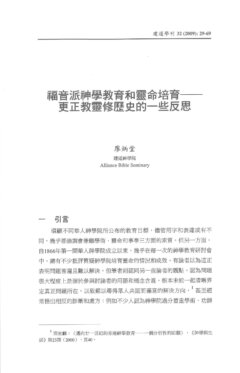福音派神學教育和靈命培育——更正教靈修歷史的一些反思/廖炳堂
撮要
本文旨在透過回顧自宗教改革以來更正教的靈修神學歷史,反思福音派神學教育和靈命培育的幾個最根本的課題:
首先,改教領袖和清教徒所強調追求的靈命,是和深度神學思考、殷勤入世事奉不可分割,並且必須是和諧結合的。他們的屬靈理想是一個敬虔的「神學人一牧者」,而非離世之隱修士。
其次,神學知識的本質不單是批判分析性和資訊性的,神學思考的訓練也必須包括整合應用和生命更新的向度。
第三,本文認為如要加強神學課程培育靈命的功能,應以培訓具神學反思能力、肯犧牲事奉之牧者的生命素質,作為統合課程整體和個別課程目標的指標,從而處理課程的割裂性、建構性不足、理論與實踐整合不足等課題。
最後,本文認為神學老師在神學院中仍必然肩負相當的牧養角色,也探討了這角色對教學和直接參與培育學生靈命事工上的含意。
ABSTRACT
This paper reviews the history of Protestant Spirituality and reflects on several basic issues in Evangelical theological education and spiritual formation:
Firstly, the kind of spiritual life that Reformers and Puritans pursued was one that would integrate well with in-depth theological thinking as well as diligent and world-affirming ministry. Their ideal spiritual image was not a world renouncing monk but a theologian-pastor.
Secondly, the nature of theological knowledge cannot be only critical, analytical and informational.Theological thinking must involve dimensions of integration, application and transformational.
Thirdly, to ensure the transformational effect of a theological curriculum, we need to set up clear indicators for evaluating individual courses and the curriculum as a whole. In order words, we should make clear the role of each course and the whole curriculum, and to what extent they can help in developing quality spiritual life that is promising in sustaining a lifelong faithful ministry of a theologian-pastor.
Lastly, this paper affirms a certain pastoral role of every theological teacher, and
this paper further explores the implications of this role in the ministry of teaching and
student spiritual formation within the seminary context.
原載於《建道學刊》32期(2009年7月),頁29-69。
作者簡介
廖炳堂
副院長(學術)








